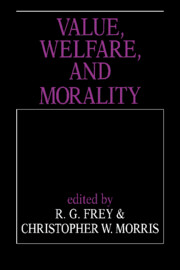Book contents
- Frontmatter
- Contents
- List of contributors
- Preface
- 1 Value, welfare, and morality
- 2 The land of lost content
- 3 Putting rationality in its place
- 4 Can a Humean be moderate?
- 5 Welfare, preference, and rationality
- 6 Preference
- 7 Reason and needs
- 8 Desired desires
- 9 On the winding road from good to right
- 10 Value, reasons, and the sense of justice
- 11 Agent-relativity of value, deontic restraints, and self-ownership
- 12 Agent-relativity – the very idea
- 13 The separateness of persons, distributive norms, and moral theory
- 14 Harmful goods, harmless bads
Preface
Published online by Cambridge University Press: 07 December 2009
- Frontmatter
- Contents
- List of contributors
- Preface
- 1 Value, welfare, and morality
- 2 The land of lost content
- 3 Putting rationality in its place
- 4 Can a Humean be moderate?
- 5 Welfare, preference, and rationality
- 6 Preference
- 7 Reason and needs
- 8 Desired desires
- 9 On the winding road from good to right
- 10 Value, reasons, and the sense of justice
- 11 Agent-relativity of value, deontic restraints, and self-ownership
- 12 Agent-relativity – the very idea
- 13 The separateness of persons, distributive norms, and moral theory
- 14 Harmful goods, harmless bads
Summary
In the last two decades, the rise of substantive ethics and, through this, the renewed development of normative ethical theories have become prominent concerns in moral philosophy. In turn, however, the development of such theories has raised to prominence issues in value theory and the epistemology of morals, and resolution of these issues has come to be regarded as vital to progress in the renewed search for an adequate normative ethical theory. In these regards, what is the relation between value and desire or preference? Do desires and preferences alone provide reasons for action? Indeed, do they provide reasons for action at all? Are judgments of value “subjective” in some way, and are they “projected onto the world”? Or are such judgments “objective,” either in the sense of having truth-values independent of their conditions of verification or in the sense of representing something inherent in the world? What is the relationship between claims of “objectivity” in either of these senses and the natural properties of things in the world? What exactly is supervenience, and what supervenes on what? Is there a viable distinction to be drawn between agent-relative and agent-neutral value? Are there any agent-neutral values, and how do we tell whether there are? Are there agent-independent values as well? The growing conviction that we are unlikely to make further progress in the development of an adequate normative ethical theory or even in substantive ethics without resolving a number of these issues, has given them an air of urgency as well as prominence.
Information
- Type
- Chapter
- Information
- Value, Welfare, and Morality , pp. ix - xPublisher: Cambridge University PressPrint publication year: 1993
